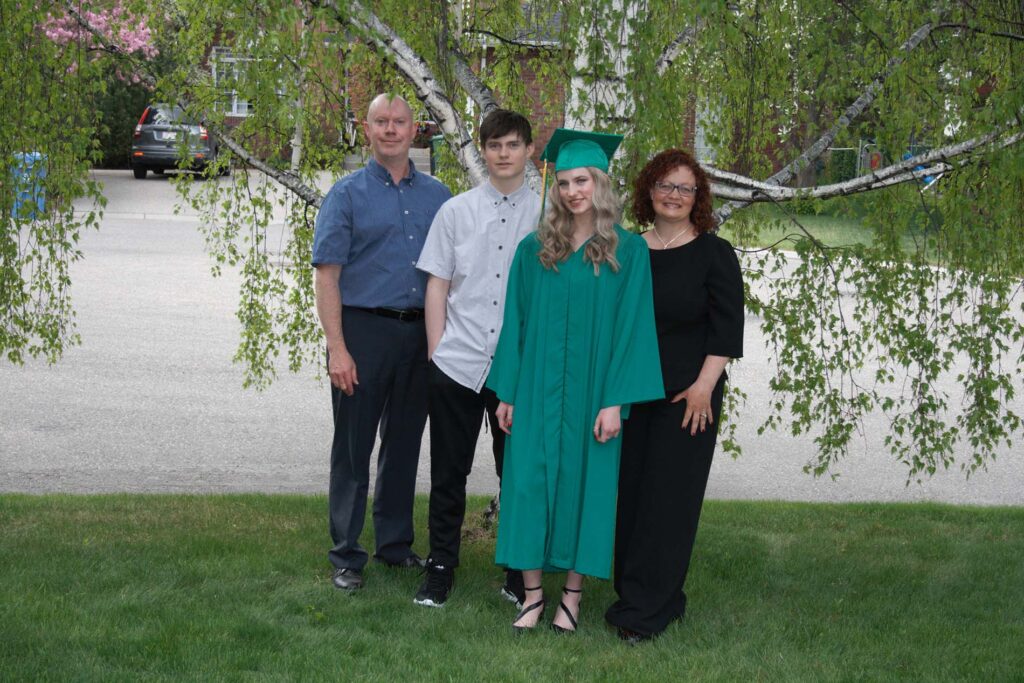When viewed from the outside, growing up, Heather had an ordinary family. Two parents, brothers and sisters, a dog, and a lovely house in Haysboro. However, pulling aside the curtains, it was anything but. Heather’s parents had significant issues with addictions, and there was family history of it on both sides.
Growing up was tough for Heather and her siblings. There was drinking and family violence. Often during holidays police were called to come and help the family.
Fortunately, Heather had a great support system. Her Aunt and Uncle stepped up to help the kids many times. Many neighbours were also aware there were challenges and would take the kids to church and be there when they ran over to call the police.
“That was kind of life when I was young and we didn’t really know it wasn’t normal.” Heather said. “Until we started going to school, and we realized that other families didn’t have the same kind of situations.”
When Heather was seven, social services stepped in and placed her and her three sisters in foster care. Her older brothers, 17 and 19 at the time, were both left at home.
Heather did not feel safe in her early foster homes. At one point, a social worker came to pick the girls at a farm in Southern Alberta and bring them safely back to Calgary. The final foster home she was placed in was with a couple who chose to become foster parents to take in the girls.
Throughout her young life, Heather had some incredible people around her, including teachers who would check on her and with whom she would sometimes stay. One teacher, Mrs. Innes, worked with all the teachers at Heather’s old school, created a Christmas Hamper filled with gifts that the school’s Principal, who was a pilot, flew out to the farm.
Mrs. Innes introduce the girls to their final set of foster parents, with whom Heather stayed with until she turned 21. Heather remained close with her Aunt and Uncle as her new parents invited them in.
“Judy was an Early Childhood Educator and understood how important natural supports and family supports were,” Heather said. “She brought my family back home and into my life.”
Even though Heather had a difficult childhood, it didn’t stop her from achieving her goals. She was the youngest person accepted into the Faculty of Social Work at the University of Calgary in 1987/88. The Dean, at the time, knew of her family and had interviewed her parents for her social work studies.
As Heather was moving through her studies, she had a mental health crisis. As often happens, trauma comes out when you’re older and as things progress in your life. She disassociated during class and would be crying throughout with no recollection afterwards. The Dean suggested that she take a year off of her studies to get support – the University would hold her place.
So, Heather did just that, and then returned to university, and finished her degree. After graduating, she went into banking and worked with CIBC, realizing that social work might be too close to home. She was still facing challenges underneath it all.
“I really wanted to look like I was competent and could handle everything. But I was really, really struggling.”
When she was 22, Heather experienced a severe depression and sought community supports. She was helped by The Alex, Calgary Counselling Centre, and the Distress Centre.
“They saved my life”.
Now, Heather emphasizes the importance of community and medical support for those experiencing a mental health crisis. Having accessible social community supports for everyone is essential AND when people are in a crisis and need immediate intervention, it’s critical to have the medical side.
Heather is happy to see how much the conversation around mental health and addiction has turned around and become somewhat normalized, especially during the COVID-19 pandemic. She’s also happy to see how the medical community has shifted the way they talk about it, understanding that it’s not just a medical issue.
“We’re actually inviting people to share their stories; I think that’s going to do so much to help people say, ‘It’s ok. I’m normal.’ We NEED to normalize it.”
Heather emphasized how mental health and addiction don’t discriminate. They can be genetic, hereditary; they can be caused by an imbalance in hormones; they can be due to trauma OR none of the above. “It’s just being human.”
The silver lining throughout Heather’s life has been having great support systems. There was a community around her, looking out for her.
“I honestly believe I wouldn’t be here had I not had that.”
Heather hopes that sharing her story helps people understand that they’re not alone, that what they’re going through matters, and that they make a difference. She believes there is strength and courage in reaching out for help and telling someone you’re struggling.
“The strongest thing you can do is actually reach out for help.”

Heather now works with the Calgary Health Foundation as a Donor Relations Manager and enjoys spending time with her family watching movies, eating fantastic meals, reading and exercising. Her life has had a sweet, full circle moment – her husband of 20 years, Todd, is Mrs. Innes’ son, and she’s still very close with her mother-in-law. Heather is breaking the cycle with her kids, as she remains open and honest with them about her childhood, her struggles, and the addictions issue in her family.
“Because of all the community agencies that I have worked with, my kids know what’s out there and if there’s ever help that I can’t give them, there are other places they can go and they don’t need to feel all alone.”


